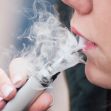California voters approved a ban on the sale of many flavored tobacco products by passing a ballot measure, Proposition 31, during the November 2022 election. Not surprisingly, R.J. Reynolds and a group of other tobacco companies and retail stores sued California, arguing that both the U.S. Constitution and a federal law preempted the new law and that its implementation would cause “irreparable harm” if it went into effect on December 21.
The U.S. Supreme Court disagreed with the tobacco plaintiffs on December 12, and in a simple 21-word opinion, denied their application for a writ of injunction. The Court gave no reason for its ruling, and there were no dissenting opinions to the denial by Associate Justice Elena Kagan, who is Circuit Justice for the Ninth Circuit, which includes California.
In denying R.J. Reynolds’ request to hear the case, the Court allows California to ban menthol, candy and fruit flavors from cigarettes and other tobacco products including vape pens and chewing tobacco. Hookahs, some cigars, and loose-leaf tobacco are exempt from the law. Stores that sell any tobacco products to those under 21 can be fined up to $250 under the new law.
The ban, which supporters believe will stem the recent upsurge in teen smoking and vaping, will go into effect on December 21. It has been a long time coming. On June 25, 2020, the California legislature passed S.B. 793 as an addition to the State Health and Safety Code. It prohibited any tobacco retailer from selling a flavored tobacco product.
After the bill was passed, R.J. Reynolds challenged the ban in federal court. Suing the Attorney General of California, the tobacco companies argued that the 2009 Family Smoking Prevention and Tobacco Control Act, which gives the Food and Drug Administration (FDA) the authority to regulate many tobacco products and contains an “express preemption provision,” surpasses state and local laws that differ from federal standards.
While the challenge was being considered, both a federal district court in California and the Ninth Circuit Court of Appeals refused to delay implementation of the law while it was being challenged. These denials led to the tobacco coalition filing an application with the U.S. Supreme Court for an Emergency Writ of Injunction on November 29.
The tobacco team’s 40-page brief began by informing the Court that two Ninth Circuit cases had been reversed in the past decade. This occurred when California tried to preempt federal standards for vehicle emission standards and when it tried to prevent the sale of cars that did not meet its higher requirements. Similarly, it said that the Ninth Circuit was ignoring the FDA’s Tobacco Control Act that preempts “any state law (like SB793) that sets a tobacco product standard (such as a ban on flavors) that differs from federal standards.”
The FDA, they argued, allows states to regulate, but not ban, tobacco products. For example, states can raise the age for purchasing tobacco products, but their brief said, “…one thing they cannot do is completely prohibit the sale of those products for failing to meet the state’s or locality’s preferred tobacco standards.” California responded that the federal law in fact preserves the authority of states and local governments to not only regulate, but ban, tobacco products.
The appellants further argued that the costs of implementing the law would cause “irreparable harm.” If the law went into effect, R.J. Reynolds said, it would no longer be able to sell menthol cigarettes in the nation’s largest market and it would therefore lose a third of California’s entire tobacco sales. Modora Brands Inc., another plaintiff and a subsidiary of R.J. Reynolds, which produces “modern oral nicotine products,” such as nicotine lozenges, stood to lose millions of dollars per year. It added that many small and family-owned businesses “will likely have to close shop entirely.”
The tobacco appellants had another unpersuasive argument. They wrote, “…the public interest and equities strongly favor an injunction,” and it will “will merely preserve the status quo that has existed for decades in California, while preventing irreparable harm to Applicants and other adverse consequences, such as driving consumers to the illicit market for products that evade federal and state regulation altogether.”
They also claimed that “four Justices are likely to grant certiorari” and that the public interest and equities favor an injunction. Although there was no explanation for the denial of the petition, tobacco’s public interest argument was no doubt found to be without merit. Scientists from the University of North Carolina, for example, studied 40 other research findings that assessed people’s attitudes toward tobacco that was laced with flavorings like vanilla, cherry, toffee and chocolate.
Li-Ling Huang, Ph.D., the primary author of the study, said they found “most tobacco products have a universal and rather strong appeal to youth and young adults, and that they were perceived as less harmful among younger people.” They found that flavors are the primary reason teens experiment with cigarettes” which causes them to become regular users.
Massachusetts previously banned flavored tobacco, and several states have banned products used for vaping. Although only Massachusetts and California have stopped the sale of flavored cigarettes, another locality that did so had very positive results. In an article entitled When They Can’t Buy Flavored Tobacco, Kids are Less Likely to Smoke or Vape, researchers from the Leonard Davis Institute of Health Economics found that when Oakland, California banned convenience stores from selling flavored cigarettes, “both vaping and cigarette use declined in Oakland among high school youth and “retail sales of all flavored tobacco products in San Francisco plummeted by 96%.”
If this statistic could be repeated throughout the county because of the Supreme Court’s refusal to stop California’s ban, hopefully other states will follow and unlike big tobacco’s claim, the public interest will actually be well served.






